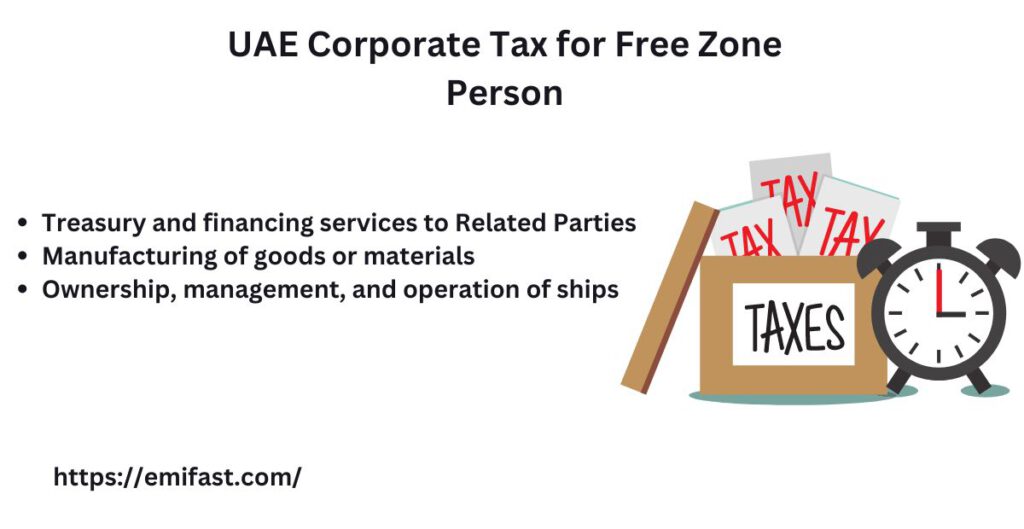The UAE has been a global money center for a long time giving lots of perks to companies and foreign investors, like no tax on profits. But in December 2022, the UAE brought in a Federal Corporate Tax (CT law) starting June 1, 2023.
The Federal Corporate Tax guide says companies making over AED 375,000 a year in taxable income will pay a 9% tax rate unless they’re a Free Zone Person (QFZP). Free zone businesses that meet certain rules can still pay 0% tax on income that qualifies, while income that doesn’t qualify gets taxed at 9%.
If you run a free zone business and want to know everything about UAE free zone tax policies, this guide is for you.
What Is New Corporate Law in UAE?
For businesses licensed to operate on the UAE mainland, the corporate tax structure is as follows:
✓ A 0% tax rate applies to taxable income up to AED 375,000.
✓ A 9% corporate tax kicks in on taxable income over AED 375,000.
Meanwhile, businesses in Free Zones face a different tax setup:
✓ Qualifying Free Zone Persons (QFZP) enjoy a 0% corporate tax on their qualifying income.
✓ Non-qualifying income in the Free Zone is taxed at 9%, although certain exceptions or reliefs may apply.
This new tax structure impacts all businesses operating in the UAE, including foreign businesses with offices here. The tax’s effect depends on whether your business is located in a Free Zone or on the Mainland during the tax period. Understanding these changes is crucial to stay compliant and avoid penalties like fines or interest charges.
Who is a Qualifying Free Zone Person?
To grasp how corporate tax affects businesses in free zones, it’s important to first understand the definition of a “Person” as per UAE Tax Law:
Natural Person: Are you a freelancer sole proprietor, or part of a civil company? The law sees you as a ‘Natural Person’. You might enjoy some Free Zone perks, but your income will still have Corporate Tax. The same rules apply to you as to businesses outside the Free Zones.
Juridical Person: Is your business a corporation or partnership? For corporate tax purposes, it’s a ‘Juridical Person’. These entities can get a 0% tax rate on qualifying income. But they need to meet specific criteria in the UAE tax laws.
In short, both natural and juridical persons can operate within Free Zones, but only Juridical Persons meeting specific criteria can be classified as “Qualifying Free Zone Persons” (QFZPs) to benefit from tax breaks, like the 0% corporate tax rate on qualifying income.
However, simply being recognized as a “Free Zone Person” isn’t enough—you also need to meet the qualifying income requirements to enjoy tax benefits.
A Qualifying Free Zone Person Must Meet All the Following Conditions:
✓ Maintains adequate substance within the UAE.
✓ Earns qualifying income as specified by a Cabinet decision, on the Minister’s recommendation.
✓ Has not opted to be subject to Corporate Tax under this Decree-Law.
✓ Complies with the Arm’s Length Principle and Transfer Pricing Documentation as per the Decree-Law.
If a Qualifying Free Zone Person fails to meet any of these conditions during a tax period, they lose their QFZP status at the start of that tax period.
The Minister may also outline conditions under which a person can retain or lose QFZP status from a different date, even if they fail to meet the criteria.
UAE Corporate Tax for Free Zone Person
The 9% corporate tax rate applies to a QFZP’s taxable income for the remainder of the tax incentive period set by the applicable Free Zone legislation, which can be extended based on conditions determined by a Cabinet decision. However, this period can’t exceed 50 years.
Cabinet Decision No. 265 divides business activities for Corporate Tax purposes into three categories: Qualifying activities, Excluded activities, and Other activities. Each category has different tax implications and is regulated by the relevant authority. Only Qualifying Activities are eligible for UAE free zone tax relief.
According to Ministerial Decision No. 139 of 2023, the following business activities are recognized as Qualifying Activities, meaning that a person conducting these is considered a Qualifying Free Zone Person:
Qualifying Activities, as defined by the UAE Ministry of Finance, are specific business operations that qualify for tax relief under UAE Corporate Tax Laws. According to Ministerial Decision No. 265 of 2023,

these include:
✓ Treasury and financing services to Related Parties.
✓ Manufacturing of goods or materials.
✓ Ownership, management, and operation of ships.
✓ Holding of shares and other securities.
✓ Logistics services.
✓ Financing and leasing of aircraft, including engines and rotatable components.
✓ Reinsurance services subject to the competent authority’s oversight.
✓ Processing of goods or materials.
✓ Headquarters services to Related Parties.
✓ Wealth and investment management services under the competent authority’s oversight.
✓ Ancillary activities related to manufacturing, treasury, and financing services of related parties.
✓ Distribution of goods or materials within or from a Designated Zone to a customer for resale, further processing, or alteration for sale.
For instance, if you’re distributing goods or materials, it must be done within or from a Designated Zone, and the goods entering the UAE must be imported through the Designated Zone.
Understanding the De Minimis Tax Rule
The De Minimis Rule is crucial in the new UAE corporate tax for free zone person. It states that if you’re a QFZP and your non-qualifying income is less than 5% of your total revenue or under AED 5 million, whichever is lower, you can still enjoy the 0% tax rate. Let’s break this down with an example.
Say your total revenue is AED 10 million, and your non-qualifying income is AED 400,000, which equals 4% of your total revenue. In this case, your business can still enjoy the 0% tax rate because your non-qualifying income falls below the 5% De Minimis threshold.
But some types of income don’t count in these calculations. This excludes money from immovable property within the Free Zone and income from domestic or foreign permanent establishments. For instance, if you own a building in the Free Zone and make money from rent, that income wouldn’t qualify under the De Minimis Rule.
Similarly, income from a branch in the mainland UAE or another country wouldn’t count as qualifying income under this rule. This exclusion ensures that the 0% tax rate applies mainly to operational income within the Free Zone rather than passive income or revenue from business activities outside the Free Zone.
As a Free Zone business, don’t assume your income automatically qualifies for the 0% tax rate in the UAE. It’s vital to consider the nature of your activities, your customer base, and the types of assets you own when calculating your corporate tax for the financial year.
Downsides of QFZP Status
While the Free Zone (FZ) tax regime offers great benefits, there are some drawbacks. If you qualify as a QFZP, you can’t join a tax group or transfer tax losses. Plus, you won’t be eligible for the Corporate Tax (CT) rollover relief mentioned in Article 26 (Transfers within a Qualifying Group) and Article 27 (Business Restructuring Relief).
If you’re operating in a Free Zone and enjoying the 0% tax rate, remember that QFZPs must still meet transfer pricing requirements under the CT Law and prepare annual audited financial statements.
Need Help with Corporate Tax?
The international tax experts at Emifast are here to guide you toward financial freedom. Our mission is simple: help you keep more of what you earn. We do this by setting up your business in UAE free zone tax locations and offering full support for every aspect of running an international business.




